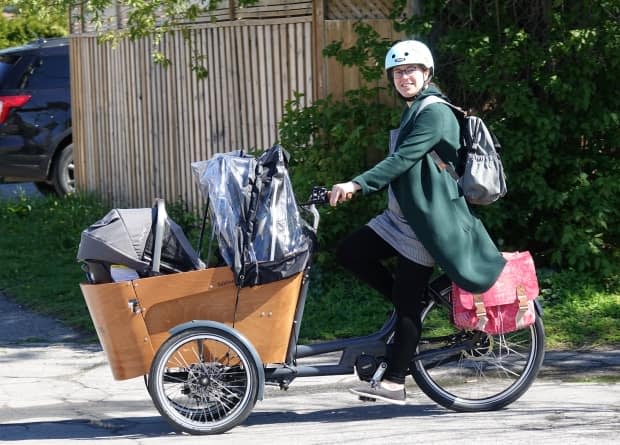Cargo e-bikes could be banned under proposed Ontario bill

Proposed legislation in Ontario to address the growing use of e-bikes risks making many existing power-assisted bicycles illegal, warn bike owners and advocates.
Bill 282, also known as the Moving Ontarians More Safely Act, contains language that would ban many e-bikes based on their configuration, wheel size or weight, even though the same bike would be permitted without the electric assist feature.
The legislation could prohibit three-wheeled cargo bikes similar to the one Ottawa's Felicity Borgal recently bought, in an attempt to avoid purchasing a second family car.
Her bike includes a battery and electric motor that give her a boost while pedalling. It can hit a maximum speed of 25 km/h.
"I can carry my kid and all the groceries. The e-assist just makes it a lot easier to make those longer trips and not have to avoid hills," said Borgal.
"I could just take the battery out and it would be legal. It's bizarre."

Could impact delivery companies, program for seniors
The proposed bill aims at differentiating e-bikes that resemble traditional bicycles from those that look more like mopeds and motorcycles, according to a statement from the Ministry of Transportation.
Municipalities have the option of joining a provincial cargo e-bike pilot program that does account for vehicles that Bill 282 — if adopted as is — would ban, although none have done so yet, the ministry said.
But critics say the bill's e-bike definitions — which include a weight limit of 55 kilograms — would exclude many power-assisted cargo bikes, as well as bike-taxis that give seniors rides as part of the Cycling Without Age program.
Parcel delivery companies already pilot-testing cargo e-bikes in Toronto could also be forced to change their fleet, said Joel Harden, the NDP MPP for Ottawa Centre.

Use U.S. model, says NDP
Harden's party is seeking amendments to the bill that would see the province adopt an e-bike classification system based on one that exists in more than two dozen U.S. states.
In that system, e-bikes that resemble mopeds and motorcycles face tighter restrictions, while e-bikes that are actually usable by pedal fall into three classes.
The first is reserved for bikes that must be pedalled for the electric motor to assist the rider, up to a maximum speed of 32 km/h. The second covers bikes that provide power even if the rider isn't pedalling, but which stop once it hits 32 km/h.
The third class covers e-bikes that must be pedalled but allow the motor to assist the rider all the way up to 45 km/h.
"This bill has none of those subtleties," said Harden, who rides a cargo bike himself. "I want to see Ontario embrace a cycling revolution for all abilities, for all kinds of folks. And e-bikes give a lot of people just that little bit of extra power to get over significant hills or to deal with the long daily commute."
While the Ministry of Transportation says it continues to work closely with stakeholders on the proposed changes, advocacy group Bike Ottawa is also calling for a closer look at the consequences of the bill.
"On the one hand, it's good to see the government updating regulations," said Érinn Cunningham, the group's president.
"But as it stands it could make it harder for families and for companies to make a green shift."
Bike Ottawa has submitted a letter to the legislative committee at Queen's Park studying Bill 282, asking them to reconsider its e-bike definitions, Cunningham added.

